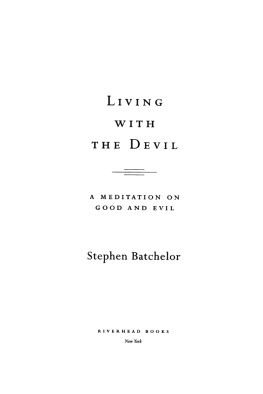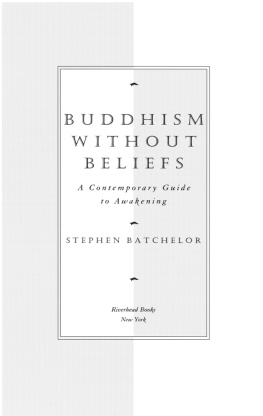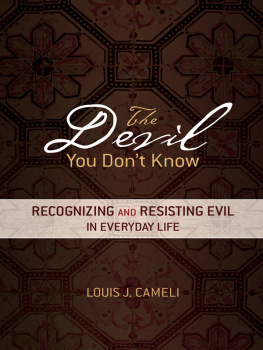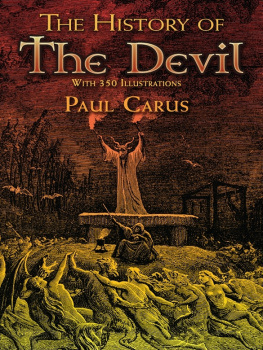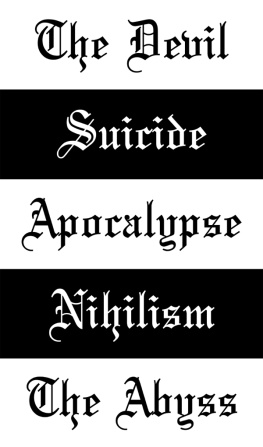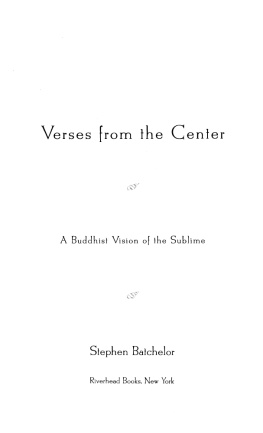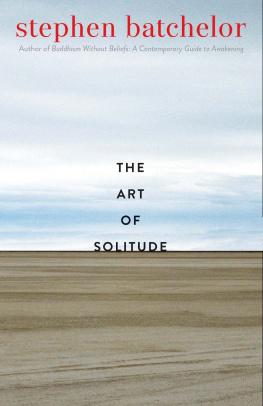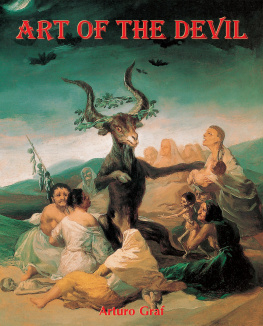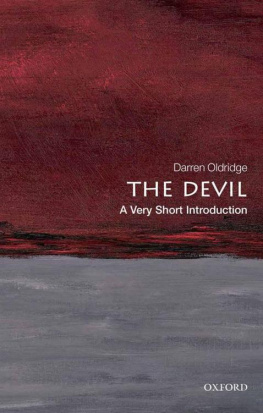More Praise for
Living with the Devil
The author of Buddhism Without Beliefs and a former monk in the Tibetan and Zen traditions, Batchelor... demonstrates how the anguish associated with the transient nature of life has preoccupied humans for centuries... that mankind has always relied on the temptations of the devil to still anxiety and create an aura of permanence. Although he explores a number of philosophies, Batchelors focus is on the path to nirvana (a cessation of desires)... [His] genuine concern and desire for a better world come through clearly.
Publishers Weekly
Stephen Batchelor opens the door to the fascinating dilemma of suffering and evil with prose so beautiful and lucid that just the reading of the book shows us the way out of delusion. This is a revolutionary text, a classic, and a must-read.
Joan Halifax,
author of Shamanic Voices
Stephen Batchelor once again offers us the rare gifts of his probing intellect, elegant prose, and provocative spiritual insights. With grace and refinement, he opens the doors of understanding we might not even have known were closed. This book is an illuminating read.
Joseph Goldstein, author of
One Dharma: The Emerging Western Buddhism
Most Riverhead Books are available at special quantity discounts for bulk purchases for sales promotions, premiums, fund-raising or educational use. Special books, or book excerpts, can also be created to fit specific needs.
For details, write: Special Markets, The Berkley Publishing Group, 375 Hudson Street, New York, New York 10014.
ALSO BY STEPHEN BATCHELOR
Alone with Others
An Existential Approach to Buddhism
The Faith to Doubt
Glimpses of Buddhist Uncertainty
The Awakening of the West
The Encounter of Buddhism and Western Culture
Buddhism Without Beliefs
A Contemporary Guide to Awakening
Verses from the Center
A Buddhist Vision of the Sublime
L IVING
WITH
THE D EVIL

A MEDITATION ON
GOOD AND EVIL
Stephen Batchelor

RIVERHEAD BOOKS
Published by the Penguin Group
Penguin Group (USA) LLC
375 Hudson Street, New York, New York 10014, USA

USA Canada UK Ireland Australia New Zealand India South Africa China
penguin.com
A Penguin Random House Company
Copyright 2004 by Stephen Batchelor
Penguin supports copyright. Copyright fuels creativity, encourages diverse voices, promotes free speech, and creates a vibrant culture. Thank you for buying an authorized edition of this book and for complying with all copyright laws by not reproducing, scanning, or distributing any part of it in any form without permission. You are supporting writers and allowing Penguin to continue to publish books for every reader.
The Library of Congress has catalogued the Riverhead hardcover edition as follows:
Batchelor, Stephen.
Living with the devil : a meditation on good and evil / Stephen Batchelor.
p. cm.
Includes bibliographical references.
ISBN: 978-1-101-66308-0
1. Religious lifeBuddhism. 2. Good and evilReligious aspectsBuddhism. 3. BuddhismDoctrines. I. Title.
BQ4301.B37 2004 2004042759
294.35dc22
First Riverhead hardcover edition: June 2004
First Riverhead trade paperback edition: June 2005
Cover design and art by Raquel Jaramillo
Book design by Chris Welch.
While the author has made every effort to provide accurate telephone numbers and Internet addresses at the time of publication, neither the author nor the publisher is responsible for errors or for changes that occur after publication. Further the publisher does not have any control over and does not assume any responsibility for author or third-party websites or their content.
For Hay
I do not know who put me in the world, nor what the world is, nor what I am myself. I am in a terrible ignorance about everything. I do not know what my body is, or my senses, or my soul, or even that part of me which thinks what I am saying, which reflects on itself and everything but knows itself no better than anything else. I see the terrifying spaces of the universe enclosing me, and I find myself attached to one corner of this expanse without knowing why I have been placed here rather than there, or why the life allotted me should be assigned to this moment [rather] than to another in all the eternity that preceded and will follow me. I see only infinity on every side, enclosing me like an atom or a shadow that vanishes in an instant.
BLAISE PASCAL
O NE
T HE G OD OF T HIS A GE

1
Parallel Mythologies
THIS IS A BOOK for those like myself who find themselves living in the gaps between different and sometimes conflicting mythologiesepic narratives that help us make sense of this brief life on earth. Some of these mythologies originate in distant times and places, while others are products of the modern world.
Whether the myths we inherit from the past come from a monotheistic religion such as Judaism or Christianity or a non-theistic tradition such as Buddhism, they share the view that a human life is fully intelligible only as part of an immense cosmic drama that transcends it. Both believe hidden powers to be at workwhether of God or karma makes little differencethat have flung us into this world to face the daunting task of redeeming ourselves for the remainder of eternity.
The myths of modernity are so close at hand that it is hard to recognize them as myths. Just as those who lived in a premodern Christian or Buddhist society did not regard their understanding of the world as mythological, we too fail to see the mythologies that underpin our sense of who we are and the kind of universe we inhabit. A dominant myth of modernity is provided by the scientific understanding of the world that has blossomed in the West during the past two centuries. So compelling is its account of the origins of the universe and sentient life, so awesome its explanatory and predictive power, so impressive the technologies made possible by its understanding of the physical world, that we refuse to acknowledge anything mythical about it at all.
Even if what we believe is empirically verifiable, that does not prevent it from functioning as a myth. No matter how true the modern scientific worldview may be, it plays a similar role in our lives today as prescientific worldviews played in the lives of those in premodern cultures. For it too explains how human life is only fully intelligible as part of an immense cosmic drama that transcends it. It too is sustained by beliefs. We believe the universe exploded out of nothing fifteen billion years ago; we believe that humans evolved by random selection of genetic mutations from more primitive forms of life; we believe in the existence of electrons and quarks. But would we be able to demonstrate the truth of any one of these claims to someone who did not believe them?

